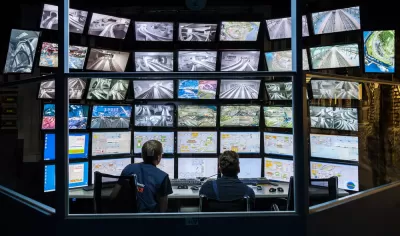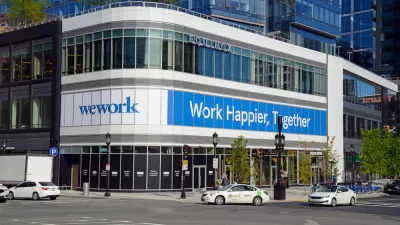Another buzzy tech company with roots in the real estate market has designs on the "smart cities" revolution.

"The company behind the WeWork real-estate empire is starting a 'future cities' initiative and has hired former Waze and Google executive Di-Ann Eisnor to run it," reports Simone Stolzoff.
"According to the We Company, Eisnor and [a] team of engineers, architects, data scientists, biologists, and economists will create products and partner with local groups around the world to help address problems spurred by globalization, urbanization, and climate change," according to Stolzoff.
According to the article, the goals and potential outcomes of the project, as announced, remain a bit abstract. However, "[t]he move to launch a smart cities program, though, is in line with one of the company’s non-spiritual missions: to compile the world’s largest data set on how people work and live." That goal is reminiscent of Facebook's ongoing mission to map the entire world's built environment to measure population density using artificial intelligence.
WeWork's foray into the "smart" or "future" cities realm also follows in the footsteps of Sidewalk Labs, a company owned by Google parent company Alphabet, which has been granted an entire neighborhood in Toronto, and potentially more, to treat as a "smart city" experiment.
FULL STORY: The We Company is launching a “smart cities” project and hired a Google executive to lead it

Maui's Vacation Rental Debate Turns Ugly
Verbal attacks, misinformation campaigns and fistfights plague a high-stakes debate to convert thousands of vacation rentals into long-term housing.

Planetizen Federal Action Tracker
A weekly monitor of how Trump’s orders and actions are impacting planners and planning in America.

In Urban Planning, AI Prompting Could be the New Design Thinking
Creativity has long been key to great urban design. What if we see AI as our new creative partner?

King County Supportive Housing Program Offers Hope for Unhoused Residents
The county is taking a ‘Housing First’ approach that prioritizes getting people into housing, then offering wraparound supportive services.

Researchers Use AI to Get Clearer Picture of US Housing
Analysts are using artificial intelligence to supercharge their research by allowing them to comb through data faster. Though these AI tools can be error prone, they save time and housing researchers are optimistic about the future.

Making Shared Micromobility More Inclusive
Cities and shared mobility system operators can do more to include people with disabilities in planning and operations, per a new report.
Urban Design for Planners 1: Software Tools
This six-course series explores essential urban design concepts using open source software and equips planners with the tools they need to participate fully in the urban design process.
Planning for Universal Design
Learn the tools for implementing Universal Design in planning regulations.
planning NEXT
Appalachian Highlands Housing Partners
Mpact (founded as Rail~Volution)
City of Camden Redevelopment Agency
City of Astoria
City of Portland
City of Laramie





























